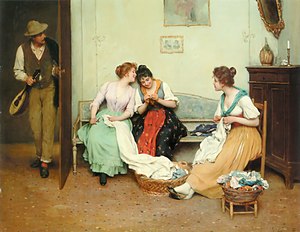Since humans have been speaking, we’ve been gossiping. Stanford professor of organizational behavior Michele Gelfand explains that gossip was at the center of life in hunter-gatherer societies, and we can see that this has persisted until today. However, evolutionarily, the role of gossip is unclear at first. Gelfand says that gossip “requires considerable time and energy on a person’s part as well as giving away potentially very valuable information,” so why gossip at all?

Gelfand says that there is in fact an evolutionary advantage to gossiping. Gossipers in hunter-gatherer societies served two purposes; “reputation dissemination” and “selfishness deterrence.” She says that sharing information about others’ reputations helped keep individuals accountable and cooperative. Gossips served the community by keeping others in line; those around them were more likely to share resources and food in order to keep in good standing with others in the community.
Fast forward about 3,000 years to ancient Greece. Ancient Greeks were very aware of gossip and rumor, so much so that it was discussed and personified in their literature. Homer portrays rumor as a messenger of Zeus in The Iliad and Hesiod describes the concept as “mischievous, light, and easily raised, but hard to bear and difficult to be rid of. […] In some ways divine” (Works and Days). Greeks understood that most of their society indulged in gossip, regardless of class, gender, age, etc. Gossip was a tool of legal and social power, particularly among women and the powerless. For example, Zobia’s use of gossip against her abuser (depicted in Against Aristogeiton 1) highlights how reputation and the spread of information can influence legal outcomes. This goes to show that gossip wasn’t always trivial, but could be a means of asserting justice or resistance where power structures ignored or denied marginalized voices.
The term gossip itself comes from the medieval Godsibb, referring to what we would now call godparents or midwives, partners in birth. Essentially, these were very close female friends. In these tight-knit communities, gossip fostered connection and
 solidarity. Gossip was – and still is – something that occurs between members of a community and, in turn, establishes or enforces community. However, as the status and treatment of women in society fell with the middle ages, so did the perception of gossip. Despite its negative reputation, gossip maintained its significance in many social contexts. For example, the Archdeacon Pavel of Janovice was a prolific gossip even though he was not called one, since he was a man. He used gossip to build trust and care for his parishioners. His actions emphasize how gossip can bond communities, even if it is often dismissed as idle chatter when performed by women.
solidarity. Gossip was – and still is – something that occurs between members of a community and, in turn, establishes or enforces community. However, as the status and treatment of women in society fell with the middle ages, so did the perception of gossip. Despite its negative reputation, gossip maintained its significance in many social contexts. For example, the Archdeacon Pavel of Janovice was a prolific gossip even though he was not called one, since he was a man. He used gossip to build trust and care for his parishioners. His actions emphasize how gossip can bond communities, even if it is often dismissed as idle chatter when performed by women.
Gossip is much more significant than we like to look at it as, and is present as in every period of human history, and plays a pivotal role in many major historical events. The relationship between gossip and political or social movements is hard to ignore, and has been for centuries. Gossip played a pivotal role in revolutions such as the American Revolution where discussions in pubs and coffeehouses helped spread revolutionary ideas. These informal spaces for gossip allowed oppressed groups to unite, share ideas, and fostered a sense of solidarity that would otherwise have been impossible. This remains true in the modern age, where gossip has founded movements such as #MeToo and Black Lives Matter. This shows how gossip can be used as a tool of resistance and social change. It is a tool that can break down power imbalances and disseminate information that those in power would prefer to suppress.

The gendered history of gossip is noteworthy as well. In the early modern period, when women were relegated to lower social status and restricted in their opportunities for political participation, gossip became one of the few ways they could assert influence. As women’s voices were silenced in other areas, gossip remained as an opportunity to express dissent, build solidarity, and enact change. This previously discussed historical context helps explain why gossip continues to be stigmatized – especially when it is associated with women – but also why it remains so powerful. Despite the negative associations, gossip is not simply idle talk; it is a tool that has been used throughout history to regulate behavior, unite communities, challenge power, and enact change.
Thus, gossip is far more than just a frivolous pastime. It has been a critical mechanism for social cohesion, legal justice, resistance, and revolution. Its role in spreading vital information and creating solidarity has ensured its survival and relevance throughout human history. What is seen as idle chatter may ultimately serve as a means of empowerment, whether by strengthening community ties or challenging the status quo.

